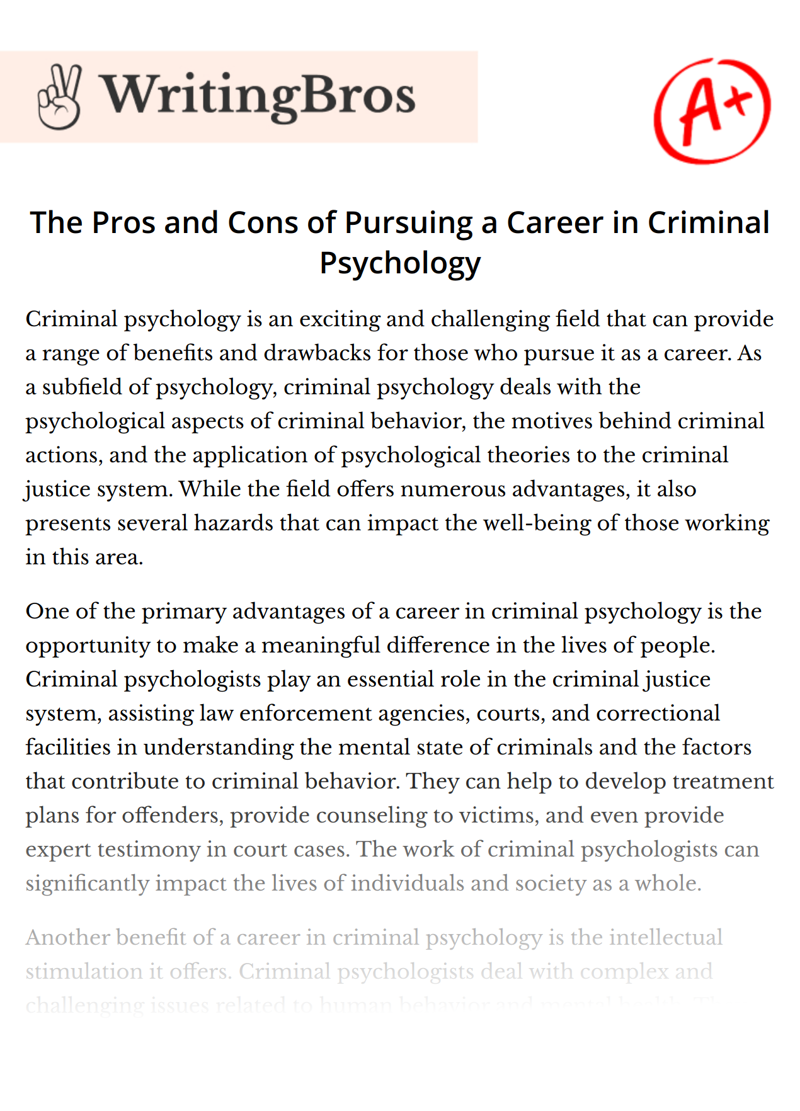The Pros and Cons of Pursuing a Career in Criminal Psychology

Criminal psychology is an exciting and challenging field that can provide a range of benefits and drawbacks for those who pursue it as a career. As a subfield of psychology, criminal psychology deals with the psychological aspects of criminal behavior, the motives behind criminal actions, and the application of psychological theories to the criminal justice system. While the field offers numerous advantages, it also presents several hazards that can impact the well-being of those working in this area.
One of the primary advantages of a career in criminal psychology is the opportunity to make a meaningful difference in the lives of people. Criminal psychologists play an essential role in the criminal justice system, assisting law enforcement agencies, courts, and correctional facilities in understanding the mental state of criminals and the factors that contribute to criminal behavior. They can help to develop treatment plans for offenders, provide counseling to victims, and even provide expert testimony in court cases. The work of criminal psychologists can significantly impact the lives of individuals and society as a whole.
Another benefit of a career in criminal psychology is the intellectual stimulation it offers. Criminal psychologists deal with complex and challenging issues related to human behavior and mental health. They use their knowledge and skills to analyze and interpret data, develop theories, and conduct research that can contribute to the field's knowledge base. This can provide a sense of professional fulfillment and satisfaction for those interested in the psychological aspect of criminal behavior.
Moreover, a career in criminal psychology can provide excellent job opportunities and financial rewards. As the demand for criminal psychologists is on the rise, there are numerous job opportunities available in the field, including government agencies, private organizations, and educational institutions. According to the Bureau of Labor Statistics, the median salary for psychologists was $82,180 per year as of May 2020. The salary can vary depending on the type of employer, job location, and level of education and experience.
However, working in criminal psychology can also pose several hazards and challenges. One of the most significant hazards is the potential for exposure to violence, trauma, and stress. Criminal psychologists often work with individuals who have committed violent and heinous crimes, which can be emotionally taxing and traumatic. They may also be exposed to dangerous situations when working with offenders, such as in prisons or juvenile detention centers.
Additionally, working in criminal psychology can be mentally and emotionally draining. Criminal psychologists often deal with intense and distressing emotions, including anxiety, depression, anger, and frustration. The work can be overwhelming, and the boundaries between professional and personal life can blur, leading to burnout and mental health issues.
Another hazard of a career in criminal psychology is the potential for ethical dilemmas. Criminal psychologists must adhere to ethical principles when dealing with sensitive information, such as the mental health records of offenders. They must also balance the needs of the criminal justice system with the welfare of their clients, often leading to challenging ethical decisions.
In conclusion, a career in criminal psychology can provide numerous benefits, including the opportunity to make a meaningful difference, intellectual stimulation, and financial rewards. However, it also presents several hazards, such as exposure to violence and trauma, emotional and mental strain, and ethical dilemmas. Those interested in pursuing a career in this field should weigh the advantages and hazards carefully, seeking professional guidance and support to maintain their well-being while serving society. Despite the challenges, a career in criminal psychology can be a rewarding and fulfilling path for those committed to making a positive impact on the criminal justice system and society as a whole.
Cite this Essay
To export a reference to this article please select a referencing style below

